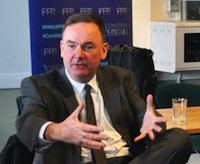The post-Corbyn re-organisation of internal Labour Party forces continued last week with the launch of Labour Together by prominent MPs and council leaders, including Jon Cruddas, Lisa Nandy, Steve Reed, Judith Blake and Nick Forbes.
 Coming just a fortnight after the formation of Momentum, the self-styled “successor entity to the Jeremy Corbyn for Leadership campaign”, Labour Together’s founders claim their aim is to “provide a space for members and representatives across the party to discuss and debate the future of Labour and Britain; and to support and inspire collective action within the wider Labour movement”.
Coming just a fortnight after the formation of Momentum, the self-styled “successor entity to the Jeremy Corbyn for Leadership campaign”, Labour Together’s founders claim their aim is to “provide a space for members and representatives across the party to discuss and debate the future of Labour and Britain; and to support and inspire collective action within the wider Labour movement”.
Writing in the Guardian on 24 October, Cruddas stated that Labour Together “will work with members who supported any of the four leadership candidates and with organisations across the spectrum of the Labour movement. We will support grassroots Labour in our communities. We know that Labour only wins when it is united and when it is patriotic and speaks for the whole country.”
Cruddas praised Labour leader Jeremy Corbyn for challenging the party to “rethink the way in which it does politics”. “This is a challenge we wholeheartedly embrace,” he said.
Cruddas led Labour’s policy review under Ed Miliband, but was disillusioned that so little of its thinking made it in to Labour’s election manifesto. Labour Together, he said, “will take forward the work of the 2012-2014 policy review and anchor it more deeply in the life of our communities. We will connect our council and city leaders and develop our local community organising and our networks of thinkers, social entrepreneurs and policy makers.”
Announcing the new group in the New Statesman two days later, Nandy and Reed added:
“Ideas are at the heart of Labour Together. The vision we offered the country at the general election wasn’t good enough… Many of the radical ideas from the Labour Party’s policy review, shaped by a wide network of supporters, activists and thinkers, never formed part of Labour’s campaign.”
They continued: “After two resounding election defeats, Labour’s first task is to show the country we’re still relevant. Labour Together will build on the work Jon Cruddas led through Labour’s policy review and take it further. Using the power of community organising and the experience of our most radical councils we will find new ways to give people the power they need to change their lives, their communities and our country. We understand that an inequality of power underpins inequalities of wealth and opportunity. Finding ways that give power back to people is at the heart of a radical renewal of politics, building a fairer society and securing social justice.”
—-
You can read Labour Together’s founding statement and register your interest in the group here.



4 December 2015
There was a lot of advice about, before the summer, to make this decisively a bottom-up grassroots campaign, and not go directly for a parliamentary lead. Apart from anything else, as one or two Campaign Group members had openly backed Brown, there was a desire not to split the group (that might seem ironic now, but the history which Harry Barnes refers to on another thread is relevent here). I still broadly think that it was the right strategy, although it was probably important to make sure that the biggest guns were on side (specifically Alan).